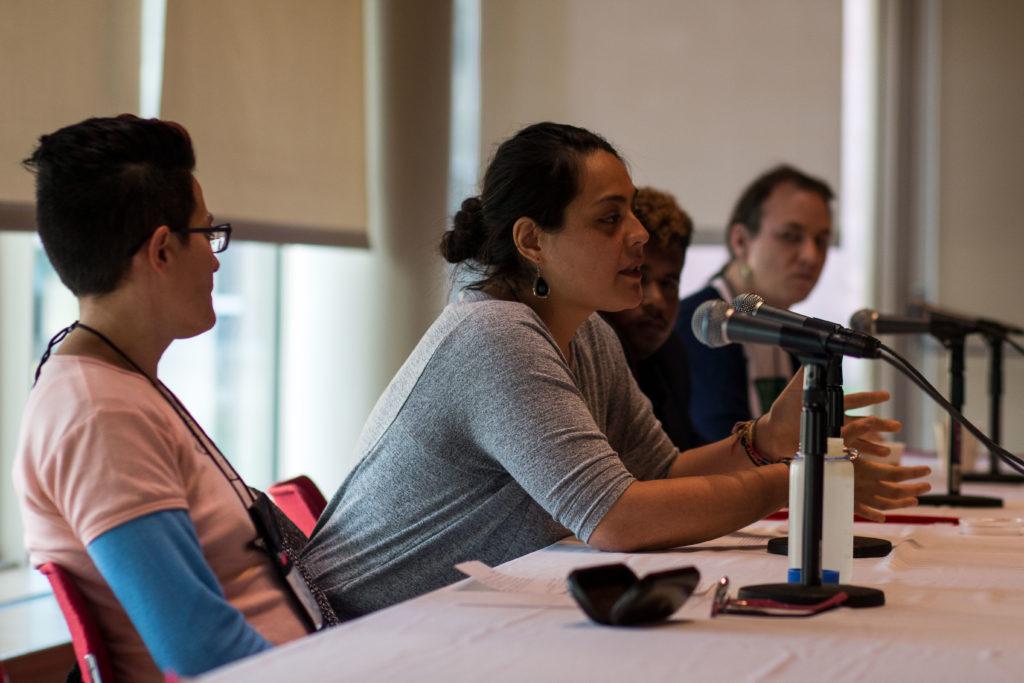—Editor’s Note: Matt Rickett’s, Amihan Huesmann’s and Camila Barrios-Camacho’s names were misspelled in certain instances in the first publication of this article. The S&B apologizes for our mistake.
Last weekend on Nov. 11, five alumni, Chris Wilde ’88, Amihan Huesmann ’93, Anna Dudda ’96, Camila Barrios-Camacho ’12 and Javon Garcia ’14, who are all of queer and other marginalized identities, came together to share their stories of struggle in a panel titled “Traversing Identities: Intersectional Activism at Grinnell College.”
“The term intersectionality was coined by Kimberle Crenshaw, specifically to describe the experience of being Black and being a woman. That term has gone into broader usage. I want to make sure we remember the origins of a term created by a Black woman,” Dudda said.
The panel drew from an event on-campus in the 80s known as The Speakeasy.
“[It] was a panel put together by student of color, where people of the audience, like myself, were invited to come, and as I like to say, sit down and shut up and be schooled. Audience members were not allowed to ask questions, make comments or respond in any way. And the people of color were there to tell their stories in blistering honesty,” Wilde said.
Throughout the panel, the alumni talked about their multiple identities, their Grinnell College experiences with those identities and their lives post-graduation. Grinnell forced some of the panelists to think differently about their identities.
“I identified as White, which is especially weird because I’m a third culture person. Don’t ask me where I’m from unless you want to sit down and have coffee. I have a whole itinerary. I had never been in a space that was primarily white American since, like, the fourth grade,” Huesmann said.
“I grew up in a time when transgenderism wasn’t a thing. It wasn’t until much, much later when I realize what was really going on,” Dudda said.
Barrios-Camacho spoke about her experience as a graduate student in neuroscience.
“I saw the reality of what graduate school is like, as a queer, as a Latina. I remember walking into the student orientation, scoping around and [thinking], ‘I’m going to be here for six years,’” she said.
For many of the older panelists, Grinnell was an especially difficult place in part due to the lack of important resources such as the Stonewall Resource Center (SRC) and the Accessibility Office. When the SRC opened in 1986, it was called the Human Resources Center, a signifier of administrational opposition.
“If even just one gay person is served by the founding of the Gay Resource center, then his work, in particular would be rewarded by that,” Wilde said, recalling the words of Matt Rickett ’89, who was part of the group that founded the organization.
“When I was at Grinnell, we didn’t have a disability access office at all. We didn’t have language around access,” she said.
“I knew I was gay since birth, but it was like, how do I say it out loud? Coming to Grinnell was a dream come true because I didn’t expect a college in Iowa to embrace me. The SRC just meant so much to me, knowing I could have that space. By the time I left Grinnell, I truly became comfortable with my sexuality,” Garcia said.
Yet the stories of the panelists urge current students to do more. The SRC, though helpful for many, is inaccessible due to its location in the basement of Younker.
Following the event, Wilde concluded that it was a success.
“All of us involved with the creation and execution of the Traversing Identities panel were extremely pleased with how it went and each of us received many thanks and accolades,” wrote Wilde in an email to The S&B.
Yet the limited time of the panel couldn’t fully honor Grinnell’s queer, intersectional alumni.
“Had we more time for the panel itself (one hour was NOT ENOUGH even for what we set out to accomplish), we wanted to expand backward in time to include older queer alumni with intersectional identities,” Wilde wrote. “We thought it was important to focus on alumni who would have been on campus during the time that the SRC has existed.”





























































